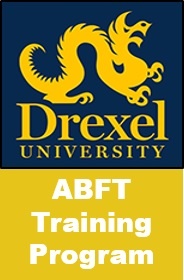The Attachment-Based Family Therapy Training Program (The ABFT Training Program)

Year Founded: 2007
Model of Therapy: Attachment-Based Family Therapy
Available training types: In-person workshops, webinars, web-conferencing supervision, video tape feedback
Attachment-Based Family Therapy, which has been both manualized and empirically supported, is unique because it is the only approach to family therapy that specifically targets family processes associated with youth suicide and depression. The trust-based, emotion-focused approach, tested thoroughly in both clinical trials and research studies, has received high ratings from SAMHSA’s National Registry of Evidence-Based Programs and Practices. Grounded in Bowlby’s attachment theory and Salvador Minchin’s Structural Family Therapy, ABFT also draws from more contemporary approaches, including Emotionally Focused Therapy and Multidimensional Family Therapy.
Founded on interpersonal theories that indicate suicidality and depression in adolescents can be first triggered—but also either increased or decreased–by the quality of relationships between family members, ABFT attempts to repair any ruptures between parent and child, or other family members, and help parent and child rebuild a secure, emotionally protective relationship.
Therapists who practice this approach presume, without ignoring the presence of biological factors, that detachment, conflict, and trauma such as neglect and abuse can lead to depression in adolescents and exacerbate existing depression. If parents are unable to help the child work through trauma and other experiences, and they do not comfort, support, or otherwise assist them, any issues may worsen. However, parents who offer protection, provide care, and allow their child autonomy may give the child a securely grounded sense of support from which they are better able to withstand life stressors.
The treatment manual for ABFT provides a clear, flexible map for therapists to facilitate reparative interactions early in therapy.
Therapists trained in the approach learn to focus on core family conflicts, vulnerable emotions, relational failures, and instinctual desires for receiving and giving attachment security.
ABFT treatment includes five main tasks:
• Reframe the therapy to focus on interpersonal development
• Build an alliance with the adolescent in therapy
• Build an alliance with the adolescent’s parents
• Facilitate conversations to address and resolve any attachment ruptures
• Promote competency and autonomy in the adolescent
ABFT trainings are designed for a range of helping professionals, including counselors, psychotherapists, psychologists, social workers, and couple and family therapists, among others. Training consists of three levels, and each training builds from the first workshop.
Level 1
1- and 3-day Introductory Workshops
Provides participants with a model overview that includes theoretical principles as well as clinical strategies.
Day 1
The first day of the three-day workshop provides participants with a model overview that includes theoretical principles as well as clinical strategies. Trainers review the roles of attachment theory, trauma resolution, and emotion regulation in this experiential approach. The structure of the five treatment tasks that outline the path of rapid, effective delivery of the approach are reviewed, as are the goals of the approach. Enrollment is unlimited to the extent that space permits.
Days 2 & 3
The second and third days build on the material learned in the first day, providing a more detailed look at processes and procedures utilized by those who provide ABFT. Trainers discuss cases, review tapes, and use role play to help participants develop a thorough understanding of the approach. Day 1 is a prerequisite for attendance of Days 2 and 3, and attendance is further limited to 30 people.
Level 2
Advanced 3-Day Workshop
Participants must attend this intensive supervision workshop within nine months of their initial training. In this follow-up training, certified ABFT trainers provide supervision through tape review, role play, and live supervision. Therapists bring in their own tapes, which they can share during training, and must also provide a write-up of at least one case in which they used ABFT. The three-day Level 1 workshop is a prerequisite, and attendance of this advanced workshop is limited to 30 people.
Supervision
After completing the three-day Level 1 workshop, therapists begin a series of bimonthly case consultation phone calls. These 90-minute calls take place in a supervision group that is limited to 15 people, and 42 calls are required over the course of two years.
Level 3
Consultation Leading to Certification
Therapists who have completed Level 1, the Level 2 workshop, and are currently participating in Level 2 Supervision may begin submitting therapy tapes for review. These tapes, of which 15 are required, correspond to the five different tasks and must demonstrate use of feedback from the consultation sessions.
These tapes are reviewed by ABFT-certified consultants, who provide in-depth written feedback and 20 minutes of consultation over the phone. The tapes are also rated using ABFT adherence measures, both by the therapist who submitted the tape and the supervisor. These ratings are discussed during the calls.
Certification
After completing the tape submissions required for Level 3, therapists must submit tapes that have not yet been reviewed. These new tapes must also represent each task, but it is not necessary for them to be from a single case. Tapes are reviewed by the ABFT supervisor, using the adherence measures, and therapists must score an average of four or better for each task in order to become certified in ABFT.
Training Not Leading to Certification
Therapists may opt to train in ABFT not leading to certification. We offer the opportunity for therapists to join in supervision groups without further commitment. Therapists are asked to commit to 10 supervision sessions at a time.
Webinars are offered on request. Plans to create a webinar series as an alternate approach to the Day 1 workshop are also in development.
About the Founder(s)
-

Guy Diamond, PhD
Guy Diamond, PhD, is Professor Emeritus at the University of Pennsylvania School of Medicine and Associate Professor at Drexel University in the College of Nursing and Health Professions. At Drexel, he is the Director of the Center for Family Intervention Science (CFIS), ABFT Training Program and the Director of the PhD program in Couple and Family Therapy. Guy Diamond is also the lead developer of the Behavioral Health Screening (BHS) tool, a web-based tool for mental health and non-mental health settings. The BHS is in primary care, emergency rooms, schools, and college health and mental health centers. Along with his co-developers, Drs. Gary Diamond and Suzanne Levy, Guy Diamond has written the first book on ABFT, “Attachment-Based Family Therapy for Depressed Adolescents,” published by the American Psychological Association in 2014.
-

Gary M. Diamond, PhD
Gary M. Diamond, PhD, a clinical psychologist and family therapist, teaches at Ben-Gurion University, where he is both a professor and chair of the psychology department. Gary Diamond’s current research primarily focuses on the development of effective approaches for families in which the parents do not accept the sexual orientation of their adolescent and young adult children. He has also conducted research examining mechanisms of change in family-based treatments, including but not limited to the therapeutic alliance, emotional processing, and behavior changes on part of the parent(s). As one of the three primary developers of ABFT, Gary Diamond participates in training programs offered around the world. In 2014, Gary Diamond and Guy Diamond received the Annual American Foundation for Suicide Prevention Research Award.
-

Suzanne Levy, PhD
Suzanne Levy holds a PhD in clinical psychology and serves as the ABFT Training Program’s Director of Training at Drexel University, where she also oversees treatment in ABFT clinical trials. Suzanne Levy conducts training workshops and therapist supervisions both at the international and national level and presents all over the world on a variety of topics, including adolescent development, depression, and substance use; resilience; emotion coaching; and ABFT.
Contact The Attachment-Based Family Therapy Training Program (The ABFT Training Program)
Please complete the following form and your message will be emailed directly to the The Attachment-Based Family Therapy Training Program (The ABFT Training Program). We highly respect and safeguard your privacy and will never disclose your email address to anyone but the organization you are contacting.




